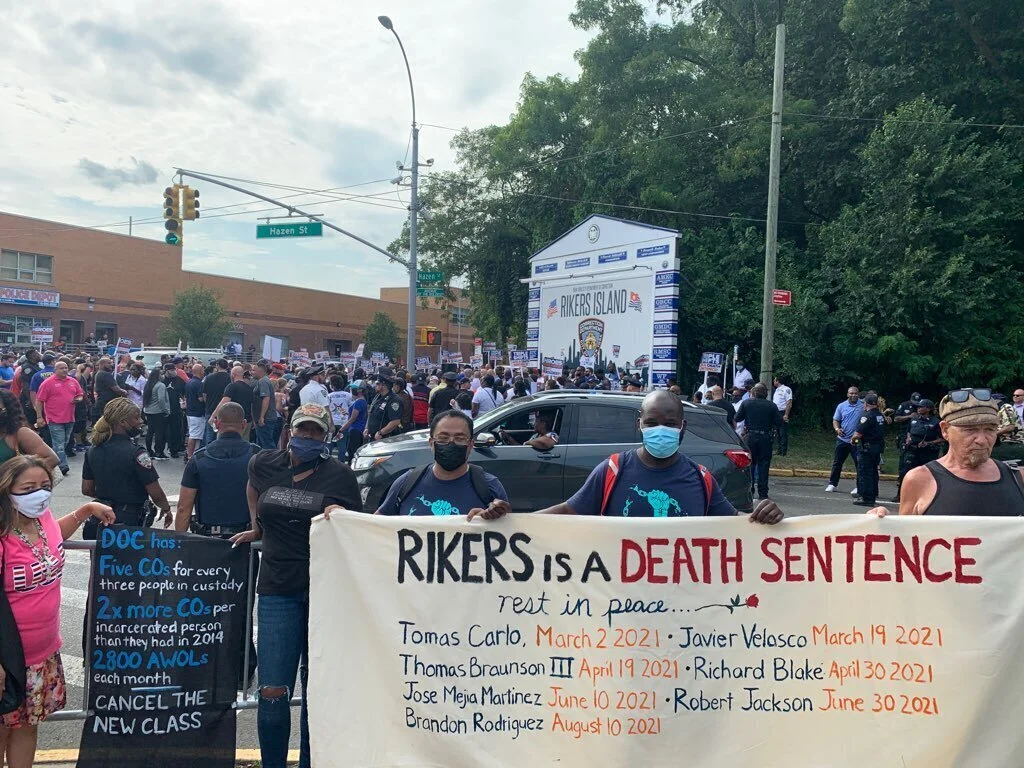Judge orders city to take action on Rikers
/Federal Judge Laura T. Swain issued an emergency order in Nunez v. City of New York on Wednesday, ordering the city to take immediate action to address the crisis on Rikers Island. Photo courtesy of Freedom Agenda
By Jacob Kaye
A federal judge issued an emergency order Wednesday requiring the city to take immediate action to address the crisis on Rikers Island.
U.S. District Court Judge Laura T. Swain ordered the city and its Department of Correction to take action to address issues raised in a recent letter from Steve Martin, the federal monitor appointed to oversee the jail complex in 2015.
The city will be required to speed up the intake process, take action to reduce the number of detainee suicides, create an interim security plan and other actions that address the crisis in the city’s jail that has seen a dozen detainee deaths in the past year.
The judge’s order is in relation to Nunez v. City of New York et. al., the case that resulted in the creation of the federal monitor. The plaintiffs in the case are represented by The Legal Aid Society.
“This order is a necessary and important step, requiring the city to take actions we have been urging for years,” said Tina Luongo, the attorney-in-charge of the Criminal Defense Practice at The Legal Aid Society. “And if the city is unable to comply with this order and show immediate improvements to safety and security in the jail, we will be back in court as often as is necessary to hold the de Blasio Administration accountable.”
The order comes two days after Mayor Bill de Blasio visited Rikers for the first time in his second term. The mayor’s visit, in which he didn’t talk to incarcerated people or corrections officers, was set up to see the progress made in recent weeks.
De Blasio and the DOC have created an action plan to tackle the crisis, however, the federal monitor argued before the court last week that the efforts fell short.
Swain ordered the city to put a 24-hour cap on the time people can be housed in intake facilities. Several of the people who died on Rikers in the past year spent days and weeks inside the processing facility, where they lacked access to medical attention.
On Tuesday, de Blasio said the intake time has been brought down to 5.5 hours on average, with the longest intake on Monday taking 10 hours.
“What has happened – and it's good news – is the intake process, which was a serious, serious concern, has now changed profoundly,” de Blasio said. “Tremendous improvement, quickly, because they opened up new facilities, added personnel.”
Swain also ordered the city to track and report how long people are housed in intake.
Additionally, she said the city should ensure that staff follow strict suicide prevention protocols, an issue raised by the federal monitor in several letters to the court as well as in his most recent report on the jails.
“Staff continue to fail to timely intervene during incidents in which incarcerated individuals threaten or engage in acts of self-harm,” Martin wrote in a letter submitted to the court on Sept. 23. “It is troubling that despite the Monitoring Team’s repeated voiced and ongoing concerns about staff failures to timely intervene in acts of self-harm, particularly in intake areas, has only worsened in the past few months.”
Swain ordered the city to create an interim security plan to address lapses in security on the island, including staff abandoning posts, failing to lock doors and not providing supervision of people in custody.
Lastly, the federal judge said the city should create a process to hire outside leadership who aren’t currently employed by the DOC, to address security concerns.
Both the city and the federal monitor were ordered to submit another report on the jail on Oct. 14. While the monitor’s report will detail the ways in which the city is sticking to the directives, the city will have to offer status updates on a number of items.
The city’s report must include the number of incarcerated individuals who were in intake for over 24 hours, the time of each individual in intake, the number of staff out on sick leave, the number of staff being medically monitored, the number of AWOL staff and the number of times a housing unit was left unstaffed.
The city and DOC has largely blamed the historic shortage of corrections officers for the deteriorating conditions on Rikers.
Last week, the city filed and then quickly withdrew a lawsuit against the Corrections Officers’ Benevolent Association, which they said had been encouraging its members to miss work by claiming to be sick when they actually were healthy.
The 12th Nunez Report from the federal monitor is expected to be delivered to the court by Nov. 15.
The two parties will reconvene for a conference on Dec. 2.
The Department of Correction did not respond to request for comment before print time.




